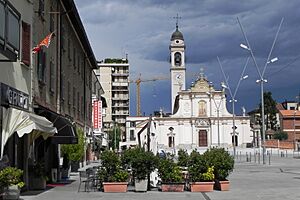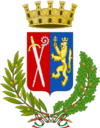Cinisello Balsamo facts for kids
Quick facts for kids
Cinisello Balsamo
Cinisell Balsom (Lombard)
|
||
|---|---|---|
| Comune di Cinisello Balsamo | ||

Piazza Gramsci
|
||
|
||
| Country | Italy | |
| Region | Lombardy | |
| Frazioni | Bellaria, Bettola, Borgo Misto, Campo dei Fiori, Casignolo, Cornaggia, Crocetta, Nigozza, Robecco, Sant'Eusebio, Villa Rachele | |
| Area | ||
| • Total | 12.72 km2 (4.91 sq mi) | |
| Elevation | 154 m (505 ft) | |
| Population
(30 November 2017)
|
||
| • Total | 75,943 | |
| • Density | 5,970.4/km2 (15,463/sq mi) | |
| Demonym(s) | Cinisellesi and Balsamesi | |
| Time zone | UTC+1 (CET) | |
| • Summer (DST) | UTC+2 (CEST) | |
| Postal code |
20092
|
|
| Dialing code | 02 | |
| Patron saint | St. Ambrose | |
| Saint day | December 7 | |
Cinisello Balsamo is a city in Italy, located in the Lombardy region. It's part of the Metropolitan City of Milan, about 10 kilometers (6 miles) northeast of Milan city center. About 75,000 people live here. The city is known for its history and interesting places to visit.
Cinisello Balsamo shares its borders with several other towns. These include Monza, Muggiò, Nova Milanese, Paderno Dugnano, Cusano Milanino, Sesto San Giovanni, and Bresso.
The city was officially formed in 1928. This happened when two separate towns, Cinisello and Balsamo, joined together. In 1972, Cinisello Balsamo was given the special title of "city" by a presidential decree.
Contents
History of Cinisello Balsamo
Until the late 1920s, Cinisello and Balsamo were two different towns. They had their own local governments. On September 13, 1928, a special royal decree made them one single municipality. This is how the city of Cinisello Balsamo was created.
The city's official emblem shows its combined past. It includes symbols from both original towns. The emblem has a pastoral staff and a sword on a red background. These symbols belonged to Balsamo. It also features a crowned lion standing on its hind legs on a blue background. This lion was the symbol of Cinisello.
Understanding the City's Name
The name "Cinisello" comes from the western part of the city. One idea is that it comes from the Latin word cinis, meaning "ashes." This might refer to the fertile, ash-colored soil in the area. Another theory suggests it comes from "Cinis Aelii," meaning "Ash of Aelius." Aelius was a Roman family name, and they might have lived here long ago.
Another idea about the name "Cinisello" comes from studies of old records. It suggests that "Cini" and "Sello" were names of old, important families from Trentino. These families might have settled in the area. They could have given their names to the place. They were also honored for their good deeds for the country.
"Balsamo" is the name for the eastern half of the city. Its name might come from "the balsam tree." However, it could also be the last name of a noble family. This family might have been important leaders in the town during the Middle Ages.
Exploring Main Sights
Cinisello Balsamo has many interesting places to see. These sites show the city's long history and culture. You can visit old churches and beautiful villas.
- Church of Sant'Ambrogio: This church was built in the 17th century. It is located in the Cinisello part of the city.
- Small church of Sant'Eusebio: This church is very old. It dates back to the time of the Lombards, a group of people who lived in Italy long ago.
- Shrine of St. Martin Bishop: This shrine was built in the 16th century.
- Church of San Martino: Also built in the 16th century, this church is in the Balsamo area.
- Villa Ghirlanda Silva Cipelletti: This villa dates back to the 16th century. It has one of the first landscape gardens in Italy. Count Ercole Silva designed this garden in the early 1800s.
- Piazza Gramsci: This is the main square in Cinisello. The Church of Sant'Ambrogio and Villa Arconati overlook this busy square.
- Church of Saint Pio X: This church was built in 1958.
- Church of Saint Joseph worker: This church was completed in 1957.
- Church of Saint Peter: This modern church was built in 1968.
- Church of Sacred Family: This church was built in 1965.
- Church of Santa Margherita: This church was built in 1961.
- Church of San Bernardino: Another notable church in the city.
Notable People from Cinisello Balsamo
Many famous people have come from Cinisello Balsamo. They have made their mark in different fields, from sports to entertainment.
- Carino of Balsamo (died 1293): He was a Dominican lay brother. He was later recognized as "beatified," which is a step towards sainthood.
- Carlo Oriani (born 1888): A well-known cyclist.
- Valerio Ruggeri (born 1934): A famous voice actor.
- Ernesto Castano (born 1939): A talented footballer.
- Pierino Prati (born 1946): A skilled footballer and coach.
- Gaetano Scirea (born 1953): A respected footballer and coach.
- Marco Veronese (born 1976): A footballer and coach.
- Roberto Cammarelle (born 1980): An Olympic boxer.
- Sfera Ebbasta (born 1992): A popular rapper.
- Luciano Spinelli (born 2000): An actor and Internet personality.
International Connections
Cinisello Balsamo has a special connection with another city. It is "twinned" with Mazzarino, which is also in Italy. This twinning helps promote cultural exchange and friendship between the two places.
Images for kids
See also
 In Spanish: Cinisello Balsamo para niños
In Spanish: Cinisello Balsamo para niños
 | William M. Jackson |
 | Juan E. Gilbert |
 | Neil deGrasse Tyson |




